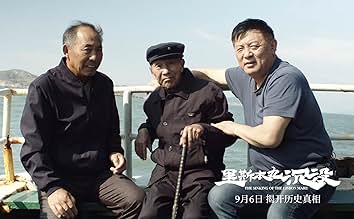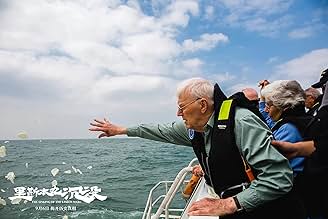Through detailed historical investigation, the crew tried their best to find the core parties and descendants from UK, US, Japan and China, getting close to the truth about the sinking of th... Read allThrough detailed historical investigation, the crew tried their best to find the core parties and descendants from UK, US, Japan and China, getting close to the truth about the sinking of the "Lisbon Maru", aka "ship of death" in WW II.Through detailed historical investigation, the crew tried their best to find the core parties and descendants from UK, US, Japan and China, getting close to the truth about the sinking of the "Lisbon Maru", aka "ship of death" in WW II.
- Awards
- 9 wins & 3 nominations total
Featured reviews
9xzq
After watching the movie, I got to know the behind the scenes and briefly talked about the production of "The Sinking of Lisbon Maru" or "Li Si Ben wan chen mo".
Recommendation: Fang Li's crazy allin shows us the truth of history, tragic epics, glorious human nature, and shameless Japan. With his determination to sacrifice everything and sell iron, would he be afraid of production challenges? He is only afraid that he will have too much on him when he leaves this world. For example, he once said, 'When I leave this world, I will definitely be penniless.'. I throw any personal property into the movie because it can stay and be left for others. The sinking of Lisbon Maru left us with too much. For example, using visual reports to re-examine the brutality of war. It's like the heaviness and emotions when the veil of history is lifted.
Watching tips: The tenacious will to survive of prisoners of war, the spirit of solidarity in supporting each other, the deep longing and unremitting search for their deceased loved ones by their descendants, and the noble humanitarian spirit of Chinese fishermen who disregard their own safety, made me cry like a doggy. There is a saying that goes: "Documentaries always creatively reside in an unknown place, intertwined with other things, but from there, they are actually very suitable for observing the various contradictions of our time." Lisbon Maru is experiencing all of this. Some people want to forget as if nothing happened, while others risk their lives to expose, leave traces, and archive.
Recommendation: Fang Li's crazy allin shows us the truth of history, tragic epics, glorious human nature, and shameless Japan. With his determination to sacrifice everything and sell iron, would he be afraid of production challenges? He is only afraid that he will have too much on him when he leaves this world. For example, he once said, 'When I leave this world, I will definitely be penniless.'. I throw any personal property into the movie because it can stay and be left for others. The sinking of Lisbon Maru left us with too much. For example, using visual reports to re-examine the brutality of war. It's like the heaviness and emotions when the veil of history is lifted.
Watching tips: The tenacious will to survive of prisoners of war, the spirit of solidarity in supporting each other, the deep longing and unremitting search for their deceased loved ones by their descendants, and the noble humanitarian spirit of Chinese fishermen who disregard their own safety, made me cry like a doggy. There is a saying that goes: "Documentaries always creatively reside in an unknown place, intertwined with other things, but from there, they are actually very suitable for observing the various contradictions of our time." Lisbon Maru is experiencing all of this. Some people want to forget as if nothing happened, while others risk their lives to expose, leave traces, and archive.
"The Sinking of the Lisbon Maru" is, without a doubt, one of the most extraordinary films of the past five years, not just in the realm of documentaries, but in global cinema as a whole. This film is a testament to the power of storytelling, historical excavation, and the resilience of the human spirit. The director, Fang Li, has achieved something truly remarkable: he discovered the wreck of the Lisbon Maru, a Japanese transport ship sunk during World War II, and in doing so, unearthed a forgotten chapter of history that even survivors struggled to make others believe.
The film meticulously pieces together the full story through interviews with survivors, historians, and local witnesses. It's a haunting reminder of how war renders everyone-British, Japanese, American, or Chinese-small and vulnerable in its shadow. The narrative is so compelling and authentic that it surpasses even the dramatic tension of films like *Dunkirk*. Fang Li's approach is not just about recounting events; it's about honoring the humanity behind the tragedy.
What struck me most was the story of "Bill No. 1," a survivor who clung to the hope of living despite the dire circumstances. His determination to survive, even when all seemed lost, is a powerful metaphor for the film's central message: optimism is the only way to confront tragedy. The film doesn't shy away from the horrors of war, but it also doesn't let us forget the importance of remembering. As the film poignantly reminds us, tragedy isn't something to be ignored or forgotten; it's something we must face head-on to ensure peace.
"The Sinking of the Lisbon Maru" is a cinematic triumph, a call for global peace, and a reminder that even in the darkest times, hope and humanity can prevail. A must-watch for anyone who believes in the power of history and storytelling.
The film meticulously pieces together the full story through interviews with survivors, historians, and local witnesses. It's a haunting reminder of how war renders everyone-British, Japanese, American, or Chinese-small and vulnerable in its shadow. The narrative is so compelling and authentic that it surpasses even the dramatic tension of films like *Dunkirk*. Fang Li's approach is not just about recounting events; it's about honoring the humanity behind the tragedy.
What struck me most was the story of "Bill No. 1," a survivor who clung to the hope of living despite the dire circumstances. His determination to survive, even when all seemed lost, is a powerful metaphor for the film's central message: optimism is the only way to confront tragedy. The film doesn't shy away from the horrors of war, but it also doesn't let us forget the importance of remembering. As the film poignantly reminds us, tragedy isn't something to be ignored or forgotten; it's something we must face head-on to ensure peace.
"The Sinking of the Lisbon Maru" is a cinematic triumph, a call for global peace, and a reminder that even in the darkest times, hope and humanity can prevail. A must-watch for anyone who believes in the power of history and storytelling.
It is quite interesting that it took over seventy years before anyone tried to discover this wreck, but once it was found nestling in the sand it opened up quite a can of worms as we discovered that it was a freighter carrying two thousand tons of wartime supplies and 1,800 British POWs. These men had been ordered to surrender after the fall of Hong Kong and were being taken to "a beautiful land" where they would be put to hard labour. Except, they didn't get very far before the ship encountered the USS Grouper that found the 7,000 ton vessel a legitimate target and holed it with one torpedo. The thrust of this documentary takes us through the next 24 hours as the ship slowly sank and the prisoners were treated as little better than malnourished ballast. Filmmaker Fang Li had managed to track down one survivor from the tragedy and as news of his filming spreads, he makes contact with another living in British Columbia and together they provide a poignant insight into just how brutal the regime that detained them was, whilst making it quite obvious that this is not a subject either feel the need to reminisce about. The Geneva Convention - which prohibits the use of POWs as glorified hostages - was simply ignored and the behaviour of their captors as the boat went down is put under quite an horrific spotlight. It's not just that they were imprisoned; it is that they are left to languish, disease-ridden, in the cargo holds of a ship without food, water, room to move or sleep and even much air to breathe. Worse still, as the vessel gradually disappeared, the survivors in the water were indiscriminately murdered by machine-gun fire. Were it not for the timely and brave intervention of the local Chinese fishing population and their flotilla of sampans and junks, it's likely that there would have been nobody left to tell of this atrocity. There is virtually no archive to illustrate this with, it's left to our own imagination; to the descriptions from the two main contributors and to additional input from the relatives of those who died/survived who reference letters and diaries to paint quite a graphically ghastly picture of inhumanity and of gutsy determination. We also hear a little from the family of the American who fired the weapon, and get some sense of the overwhelming feeling of guilt he felt when he later discovered that it wasn't just the materiel he sent to the depths. It does suffer a little from information overload. There is a lot of text on the screen and I think it might have worked better focussing on fewer families. It might also have benefitted from more engagement with the current Japanese authorities. Perhaps a more full explanation from the Navy or it's embassy in London as to the extent to which this was policy or just individual zealousness or, of course, both? With no one involved left now, this serves to deliver a salutary reminder of just how cruel mankind can be to each other and of the sacrifices people made for King and country on the other side of the world.
10r-62558
Thanks to the director to tell us this history, history
cannot be forgotten.
The POWs were all so young, i cannot hold my tears when i was watching the documentary. I cannot imagine how desperate they were and words cannot express the feelings.
Actually anybody knows history understands it's a quite complicated history for Chinese people. That's why the kindness and selflessness of the fishermen in Dongji island China are so moving and inspiring. They could've been killed by Japanese soldiers but still they did everything they could to help the English POWs. Humanity is the only treasure in war.
Hope there's no war in the world and the way from home is not long anymore.
The POWs were all so young, i cannot hold my tears when i was watching the documentary. I cannot imagine how desperate they were and words cannot express the feelings.
Actually anybody knows history understands it's a quite complicated history for Chinese people. That's why the kindness and selflessness of the fishermen in Dongji island China are so moving and inspiring. They could've been killed by Japanese soldiers but still they did everything they could to help the English POWs. Humanity is the only treasure in war.
Hope there's no war in the world and the way from home is not long anymore.
The most regrettable thing is that this film has its own significance. To document, to not forget-that is its greatest meaning. Do you know what it means in this day and age for everyone to sit in silence until the lights come on? It means hundreds of people who can never return home. It means 'Tell her I've given my all trying to return to them.' It's the gentleness of the Chinese people, the heart-wrenching longing of later generations, the last survivors who never saw the finished film, and the hypocrisy of the Japanese. It's too painful. If it were my father or grandfather... 'The song of humanity is the song of courage.' That song is too painful, and in that moment, the resonance of humanity shines brightly.
Did you know
- TriviaSubmitted for Best Documentary Feature Film category of the 97th Academy Awards in 2025.
Details
- Release date
- Country of origin
- Languages
- Also known as
- The Sinking of the Lisbon Maru
- Production companies
- See more company credits at IMDbPro
- Runtime2 hours 3 minutes
- Color
Contribute to this page
Suggest an edit or add missing content


![Watch Trailer [OV]](https://m.media-amazon.com/images/M/MV5BOWNjOWFiMzEtODE2Ni00ZDA5LTgwOGEtYjg1ZDAzNzM0MzljXkEyXkFqcGdeQXRyYW5zY29kZS13b3JrZmxvdw@@._V1_QL75_UY281_CR10)


















